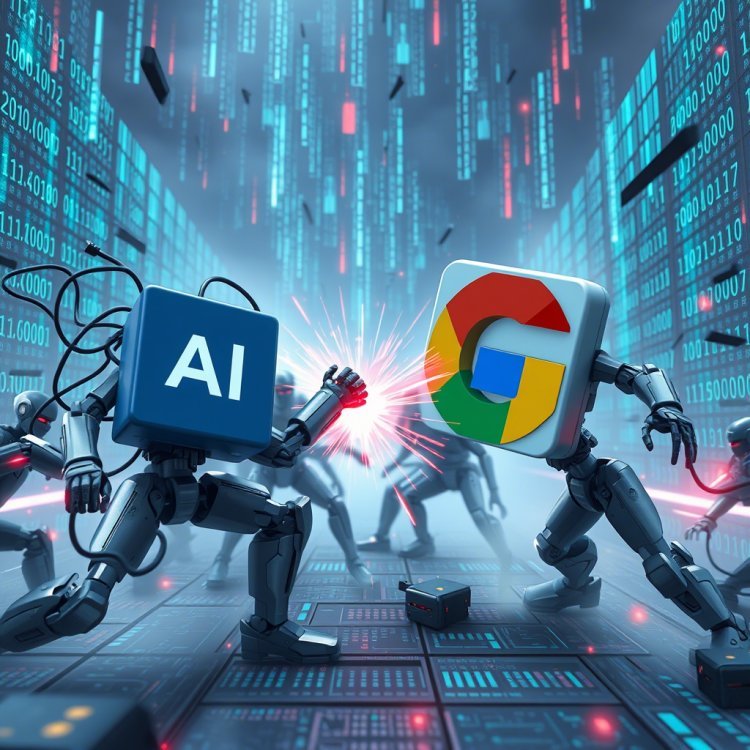Is AI War Going to Kill Google? The Battle for Tech Dominance
Is AI war going to kill Google? Discover how AI search engines challenge Google and if it can survive the AI revolution.

The world of technology is evolving at a breakneck pace, and artificial intelligence (AI) is at the center of this transformation. With AI-powered search engines, chatbots, and automation tools emerging rapidly, many speculate that Google, the long-standing leader in search technology, could face an existential threat. But is AI really going to kill Google? Or will Google adapt and maintain its dominance? Let's explore this AI war and its potential impact on Google’s future.
The Rise of AI-Powered Search Engines
AI has revolutionized search by making it more personalized, intuitive, and efficient. Traditional search engines rely on algorithms that rank websites based on keywords and backlinks. However, AI-driven platforms like ChatGPT, Perplexity AI, and Bing AI take it a step further by providing direct, context-aware answers instead of just links.
Key Features of AI Search Engines
-
Conversational Responses: Unlike Google, which presents multiple search results, AI-powered search engines provide direct, well-structured answers.
-
Personalization: AI understands user preferences better and delivers customized responses.
-
Faster Information Retrieval: AI can summarize content, removing the need to click through multiple links.
-
Voice Search Optimization: AI integrates seamlessly with voice search, making it more accessible.
These advantages suggest that AI-powered search engines could challenge Google's traditional model, raising concerns about its longevity.
Google’s AI Strategy: Adapting to the Change
Despite the rise of AI alternatives, Google is not sitting idle. The company has invested heavily in AI technology, including Bard (its conversational AI), Google Gemini, and advancements in machine learning.
How Google is Fighting Back
-
Bard AI: Google’s response to ChatGPT, Bard aims to provide conversational AI assistance directly within Google Search.
-
Generative Search Experience (SGE): Google is enhancing search with AI-generated summaries to keep users engaged.
-
MUM (Multitask Unified Model): This AI-driven algorithm improves search queries by understanding complex questions better than traditional search ranking.
-
AI Integration with Google Workspace: Tools like Gmail, Docs, and Sheets are integrating AI to improve user efficiency.
-
Voice Search & Smart Assistants: Google Assistant continues to improve, competing with other AI-driven virtual assistants.
Rather than being defeated, Google is evolving and incorporating AI into its ecosystem.
AI War: Who Are Google’s Biggest Competitors?
Several companies and startups are challenging Google’s dominance in search and AI-driven services. Some notable competitors include:
-
OpenAI (ChatGPT): ChatGPT provides AI-powered answers, reducing the need for traditional search engines.
-
Microsoft Bing AI: Microsoft has integrated OpenAI’s technology into Bing, offering conversational search experiences.
-
Perplexity AI: A rising player, Perplexity AI provides AI-generated responses with accurate sources.
-
You.com: A customizable AI search engine designed to give users more control over search results.
These competitors are leveraging AI to create more user-friendly search experiences, pushing Google to innovate faster.
Will AI Kill Google?
While AI is disrupting search technology, it is unlikely to completely replace Google for several reasons:
1. Google’s Ecosystem is Too Strong
Google dominates not just search but also digital advertising, cloud computing, and mobile operating systems (Android). Its ecosystem is deeply integrated into billions of users’ lives.
2. Trust and Data Accuracy
AI-generated responses sometimes produce inaccurate or biased information. Google’s traditional search model, which provides multiple sources for verification, is still preferred by many users.
3. Monetization Strategies
Google generates billions of dollars through its advertising model. AI search engines have yet to find a viable business model that can compete at scale.
4. Regulatory and Ethical Challenges
AI models face increasing scrutiny regarding data privacy, misinformation, and ethical concerns. Google, as an established player, has more experience handling such challenges.
The Future of AI and Google
Rather than AI killing Google, we are more likely to see a hybrid model emerge where AI enhances Google Search rather than replacing it. Google is already implementing AI-powered summaries, voice search improvements, and AI-generated insights within search results.
Conclusion
The AI war is real, but Google is far from being eliminated. While AI-driven search engines are gaining traction, Google’s adaptability and vast resources make it unlikely that it will be completely dethroned. Instead, the future will likely see AI and traditional search coexisting, with Google continuing to lead the way in innovation.
What's Your Reaction?















